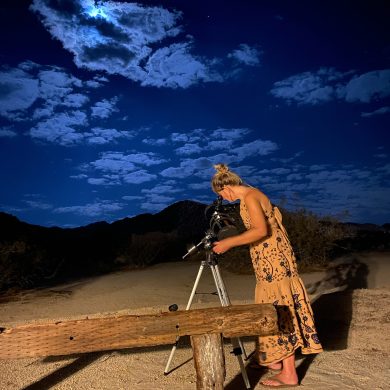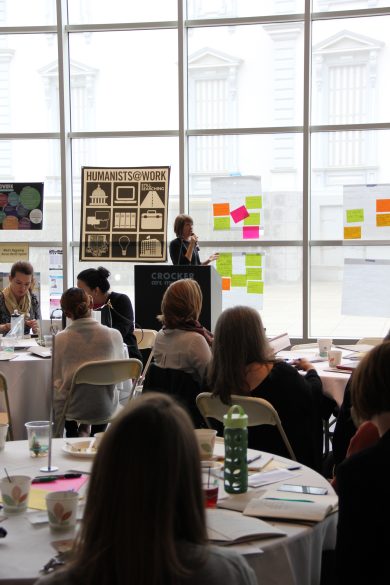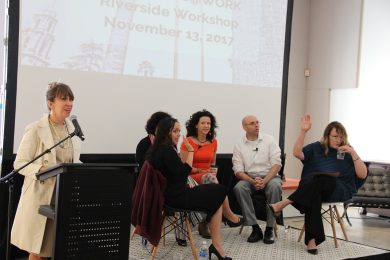 Kelly Anne Brown received her PhD in Literature at UC Santa Cruz in 2011. After completing her degree, Brown went on to work at the University of California Humanities Research Institute (UCHRI), where she researches the trajectories of Humanities PhDs and supports programs to improve career outcomes and university support of its graduate students. As Brown explains, “my work is…centered on the critique of what I see as institutional failures related to the limited or lack of support for our grad students and alumni.”
Kelly Anne Brown received her PhD in Literature at UC Santa Cruz in 2011. After completing her degree, Brown went on to work at the University of California Humanities Research Institute (UCHRI), where she researches the trajectories of Humanities PhDs and supports programs to improve career outcomes and university support of its graduate students. As Brown explains, “my work is…centered on the critique of what I see as institutional failures related to the limited or lack of support for our grad students and alumni.”
To celebrate Alumni Week, we caught up with Brown to have a conversation about both her personal and professional journey after the PhD. Brown will join us Friday, April 22 for the Alumni Week edition of our PhD+ series. At this PhD+ panel, called Stories from the Field, humanities PhDs like Brown will discuss their diverse career experiences and offer opportunities for current graduates and alumni to expand their professional networks.
Goodmorning, Kelly! Thank you again for taking the time to chat with us here at THI as a graduate student alumna.
You completed your PhD in the Literature Department at UC Santa Cruz in 2011. What has your professional journey been like since then?
My professional journey has been surprisingly boring, in that after taking a year post-PhD to give birth to my daughter and not work outside the home, I returned to the university and have been working for the past ten years at the same employer: the University of California Humanities Research Institute (UCHRI). Based at UC Irvine but working across all 10 campuses of the UC system, UCHRI supports research in the humanities through competitive grants programs and research-driven initiatives. While I began my employment at UCHRI as a research programs manager hired to manage two grant-funded UC-wide programs (one on religion and diasporic studies and the other on the humanities and changing conceptions of work), I’ve been associate director for most of my time here.
Well, maybe the journey hasn’t been that boring. Pursuing the UCHRI opportunity meant that my family had to relocate from Oakland to Orange County, which was, well, difficult on a variety of cultural, social, emotional, and financial registers. It was certainly a sacrifice, though one we are glad to have made. And my work at UCHRI has been enormously engaging intellectually, offering a wide range of humanities research projects to develop and support, and allowing me to create professional networks with faculty, students, and especially staff, across the UC and beyond. I’ve served as a PI on a national grant on professional outcomes for PhDs, for example, led a group of UC staff conducting international research on humanities research infrastructure, and recently co-facilitated a UC webinar on debt and the public service loan forgiveness program with my UC Irvine faculty colleague Jeanne Scheper, where over 1,000 people registered for the webinar. There are a lot of opportunities within the UC, and while I’m critical of many aspects of our system, I think that it plays an important role in supporting public education in California.
You are currently the Associate Director of the UC Humanities Research Institute (UCHRI). That work sounds incredible! At UCHRI, you have worked on a variety of programs like Humanists@Work and Horizons of the Humanities that reimagine what working in the humanities could look like. I bet it’s really difficult to pick, but can you tell us about one of your favorite initiatives and how that project is expanding opportunities for humanists to reimagine their careers?

Brown at a Humwork event in Sacramento.
Most of the initiatives I work on or oversee aren’t related, directly, to expanding opportunities for humanities PhDs post-degree, though supporting graduate student research certainly is a component of all our programs. So of all the initiatives I’ve developed, I think that Humanists@Work (Humwork) has been the most relevant to the careers conversation. Humwork has done a lot to change UC and national conversations about post-PhD professional outcomes as well as influence the kind of work we do at a programmatic level to support those PhDs who want and/or need to consider a range of non-professorial careers upon graduation. For about five years, Humwork physically brought together grad students from around the system to engage in networking dinners and daylong workshops that would address some typical professional development topics like resume creation, informational interviewing, and panels with PhD alumni (though these might be standard topics now, we made sure to do them in ways that challenged traditional approaches). What Humwork did that was unique was to insist that these workshops must also address topics that used to be considered peripheral to the work of professionalization–topics like debt or mentorship. This was all happening as we were investing in the development of networks across UC graduate students and our UC PhD alumni. And just because I have the space, I want to plug UCHRI’s summer research internship which will help usher in a new phase of network development for grad students.
For the past four years we’ve been in a research phase, collecting and analyzing data as part of a grant awarded to the UC from the Council of Graduate School’s Career Pathways project (funded by the Mellon Foundation). The outcome of this research is a data booklet that I’m quite proud of: Stories from the Field. The booklet engages with many of the issues critical for our graduate students to encounter well before they find themselves post-PhD. For example, we at UCHRI have been tracking our PhD alumni, and think it’s important to document the kinds of professional positions they’ve pursued (our new Humwork series Alumni@Work does this as well). I think that models are important for imagining, and our alumni have pursued diverse career opportunities that, at least for those of us interested in work as a condition of life, find it fascinating to examine. The Stories booklet is unique in that it utilizes quantitative and qualitative data to address the career landscape broadly for humanities PhDs while also reflecting upon some common alumni attitudes towards how graduate school did (or didn’t) prepare them for their careers. And the booklet situates all of this data within larger arguments about the need to better understand the impact of advanced humanistic expertise at work in the world beyond teaching at the university.
Much of your current research and writing is about different ways we can professionalize Humanities PhDs and prepare them to take jobs outside of traditional faculty appointments. What excites you about that paradigm-shifting work? What would you say are the most rewarding and the most challenging parts of making this transition for Humanities PhDs?
I think we have a very long way to go in terms of the paradigm shift that you’re referencing, though the robustness of campus-based programming speaks to the ways in which this work has become a part of our humanities infrastructure.
To be fair to my colleagues who actually write on topics that directly address helping PhDs pursue diverse career objectives, my work is much more centered on the critique of what I see as institutional failures related to the limited or lack of support for our grad students and alumni. I am not qualified to advise graduate students in their careers; but because of my programming experience, and in particular the data collection I did for the Stories project, I am qualified to speak to how some UC alumni reflect on their transition to post-PhD employment and what they find most rewarding. (An aside: one question I asked in the Stories focus groups was “What has most surprised you, or what are the biggest adjustments you’ve had to make, since finishing the PhD?” and almost every focus group very briefly answered this question in order to reframe the question to address what surprised them about graduate school, and what adjustments they made in order to fit into their programs. Fascinating, right?)
But okay, some generalizations. Losses first: Alumni did reflect upon how moving into non-professorial careers felt a bit like they were leaving behind their academic research, losing contact with their university colleagues, and closing a door on a life that had once been at the center of their imagined futures. Gains: Alumni reference that in their current positions they are positioned to have “real-world impact” with the resources necessary to do this, have good salaries (with frequent advances in terms of positions and salaries), are able to maintain a work/life balance that suits their particular needs, and feel well respected for the strengths they bring to their work. There’s so much more to say here, but I’d encourage people reading this–especially faculty–to bring their alumni to campus and ask them this question.
In your opinion, how do graduate students trained in the Humanities make the case to potential employers that they have transferable skills that make them valuable assets to organizations, businesses, and institutions outside the traditional university setting?

Brown introducing a panel in Riverside.
Ideally, grad students trained in the humanities would have an easier time making their individual cases to employers because their institution (i.e., us) would have already communicated much more in terms of who we are and what we do in the humanities to working worlds outside the academy. As it is, it’s each person for themselves in terms of articulating one’s value to an organization and also explaining what the humanities, and humanities research more specifically, contribute to our society. That’s a lot to ask our alumni to carry, though they do. And many of them have done it quite successfully. All job candidates, whether you have a PhD or not, have to “make the case” to potential employers–and truly, I don’t object to this. But when 7+ years of your life has been dedicated to this “thing” of the PhD, and the PhD isn’t something that is read by many organizations, it’s a wonder the university doesn’t take a more active role in translation, if not advocacy. I think this is especially important for underrepresented scholars, whose families may not have the kind of professional networks that well situate one for success should the academic job not pan out. It’s one of the reasons why programs like the ACLS Public Fellows program and THI’s Public Fellows program are so important. Not only do they provide paid professional experiences for graduate students, they also do important practice-based outreach to different communities of employers.
The transferable skills conversation is an important one, and organizations like the MLA, AHA, and Imagine PhD all have ample resources on this topic. One of the lessons I learned early on in programming Humanists@Work, however, is the importance of maintaining, and indeed encouraging, the space for criticality within all of this. I know some in the professional development circles would (and have) roll their eyes at this, but I’m resolute: if we let go of the critical analysis–of institutions, of experiences, of culture, of texts, and of ourselves–as a capacity that we’re uniquely qualified to contribute, we’ve already lost the game/battle/war/whathaveyou before we’ve barely begun. If anything I’d push the humanities to be more critical, especially of our own practices within the university. And while we do need to consider a sensitive framing of this “skill” for potential employers, I don’t want to imagine the humanities playing a role in educating students who don’t fully understand the life and death stakes of subordinating all other concerns to skill–especially at a time when the precise nature of what is at stake (like democracy or religious freedom) is very clear all over the world.
Why do you think that the Humanities remain a fundamental and necessary part of education and society generally?
I know what I’m supposed to say here, though I’m afraid I don’t have a new, interesting defense of the humanities to share, or even a creative reinterpretation of why the humanities matter. Obviously I think they do. I hope I would, having given the last fourteen years of my professional life to the humanities! (18 years if you add my undergrad training). A close friend recently reminded me of Simon During’s “Stop Defending the Humanities” piece where During writes that “Indeed the humanities are not the kind of thing that can be defended by reference to a single practice or even set of practices, a single value or set of values” and I must admit that that’s closer to where I am these days.
And yet just this morning I had a long conversation outside of my daughter’s elementary school with a mom friend about reading, and American reading habits (my friend is Italian), and how we’re often surprised by how little and poorly people read, at least in some of the circles we encounter socially through our children’s networks (and this is in a very affluent Orange County coastal community). And so when pressed to try and answer your question, which I very much want to do, I would emphasize the importance of reading, and the ways in which the humanities do and should lead by teaching students how and why and what and with whom to read. The desire to read in conversation with others is what ultimately necessitated grad school for me; and alongside teaching, reading is probably the skill I most expertly developed in my graduate studies. Reading teaches many of the transferable skills that we deem as important “marketable” skills for our undergrads, as well as the kinds of values that I would like to believe the best of the humanities, whatever that is now, and in the future, stand for.
After those big questions, I thought we could end on a fun one! What space do you miss most on the UC Santa Cruz campus, and why?
I miss eating salads at Stevenson. The afternoon light intensifying the almost unbearable heat of the coffee shop in fall. Crossing paths with friends and colleagues and former students. Graduate school was a mostly enjoyable experience, though I couldn’t imagine pursuing a PhD right now. I’m incredibly empathetic with the housing and cost of living (stipends) discussions happening at UC Santa Cruz, and so it’s impossible for me to think about space at Santa Cruz without remembering these challenges too.